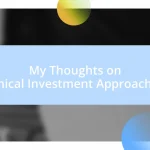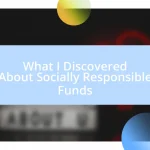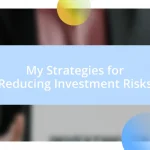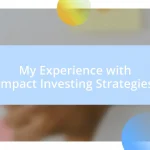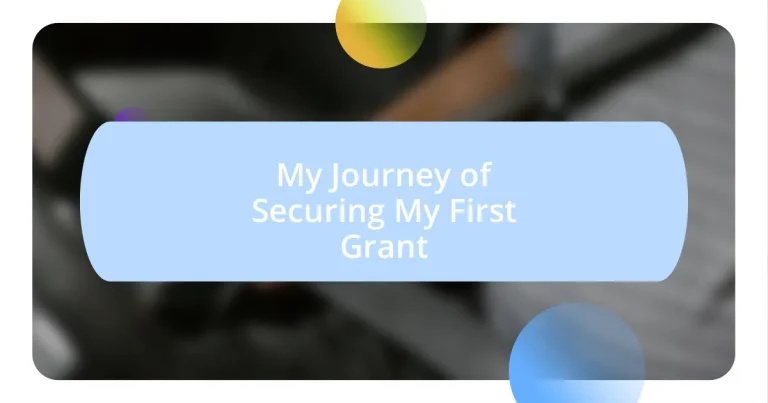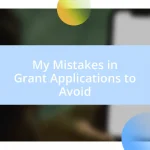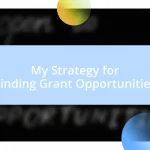Key takeaways:
- Grants provide essential financial support and validation for projects, turning ideas into reality.
- Thorough preparation, including goal reflection and organized tracking of grant options, enhances the grant application process.
- Networking can uncover hidden grant opportunities and foster community support, strengthening proposals.
- Following up post-submission demonstrates initiative and can yield valuable insights about the review process.
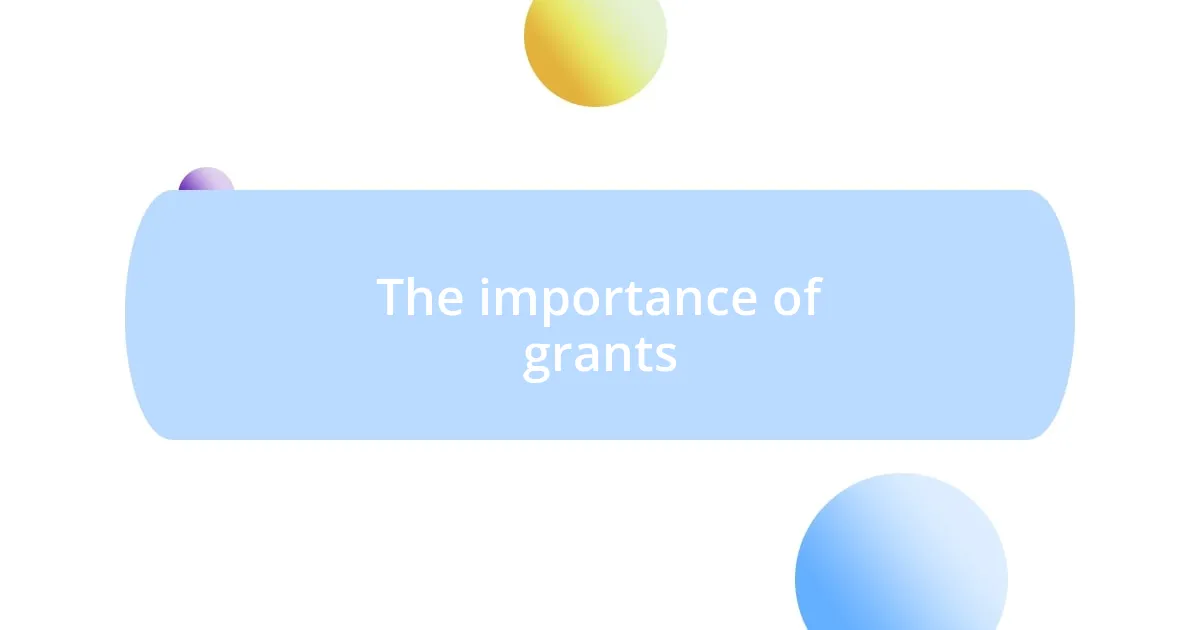
The importance of grants
Grants play a crucial role in transforming dreams into reality. They offer financial support that can help individuals and organizations pursue projects that might otherwise remain just ideas. I remember when I first stumbled upon a grant opportunity; it felt like discovering a hidden treasure that could lift my project off the ground.
Think about it—how many innovative ideas go unrealized simply because of lack of funds? Grants not only provide the necessary resources but also validate the importance of the work being done. When I applied for my first grant, I felt a renewed sense of purpose, knowing that others believed in my vision enough to invest in it.
Unearthing a grant can be a validation that fuels passion. Being awarded a grant is more than just financial support; it’s a crucial acknowledgment of the effort and thought you’ve put into your work. It creates a community of like-minded people who are equally devoted to making impactful changes, and that sense of connection can be incredibly powerful.
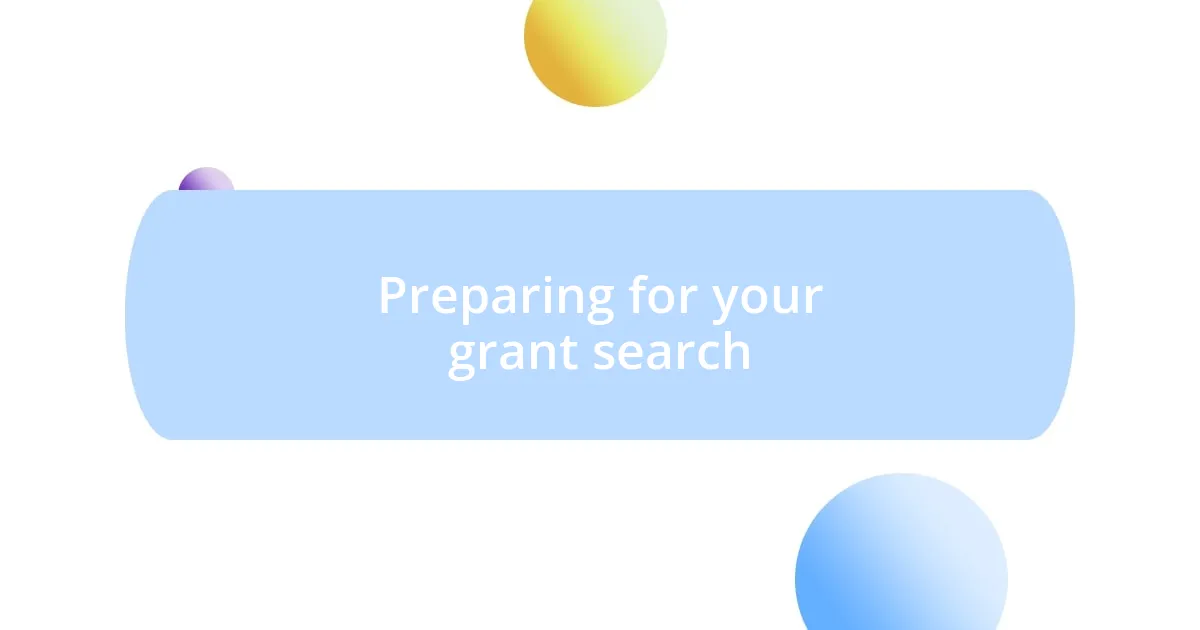
Preparing for your grant search
Preparing for your grant search requires a blend of research and introspection. When I set out on my own journey, I realized the importance of knowing exactly what my project needed. It’s vital to reflect on the goals you want to achieve and identify which grants align best with those goals. I found that this reflection not only sharpened my focus but also boosted my confidence as I navigated through countless grant options.
Equally important is creating a well-organized system to track your findings. I started with a simple spreadsheet where I noted the grant’s name, eligibility criteria, funding amount, and deadlines. This became my go-to resource, helping me prioritize which grants to apply for first. It may seem tedious, but trust me, having everything laid out clearly can save you from unnecessary stress later.
Don’t underestimate the power of networking during this stage. Connecting with others in your field can lead to valuable insights about grants you may not have encountered otherwise. I remember reaching out to a mentor who pointed me toward a niche grant that aligned perfectly with my project. However, it wasn’t just about that grant; it opened doors to conversations that inspired new ideas and approaches I hadn’t considered before.
| Key Aspect | My Experience |
|---|---|
| Reflecting on Goals | Identified what my project needed, which boosted my confidence. |
| Organizing Findings | Created a spreadsheet that became my go-to resource for tracking grants. |
| Networking | Engaged with a mentor who guided me to a niche grant and inspired new ideas. |
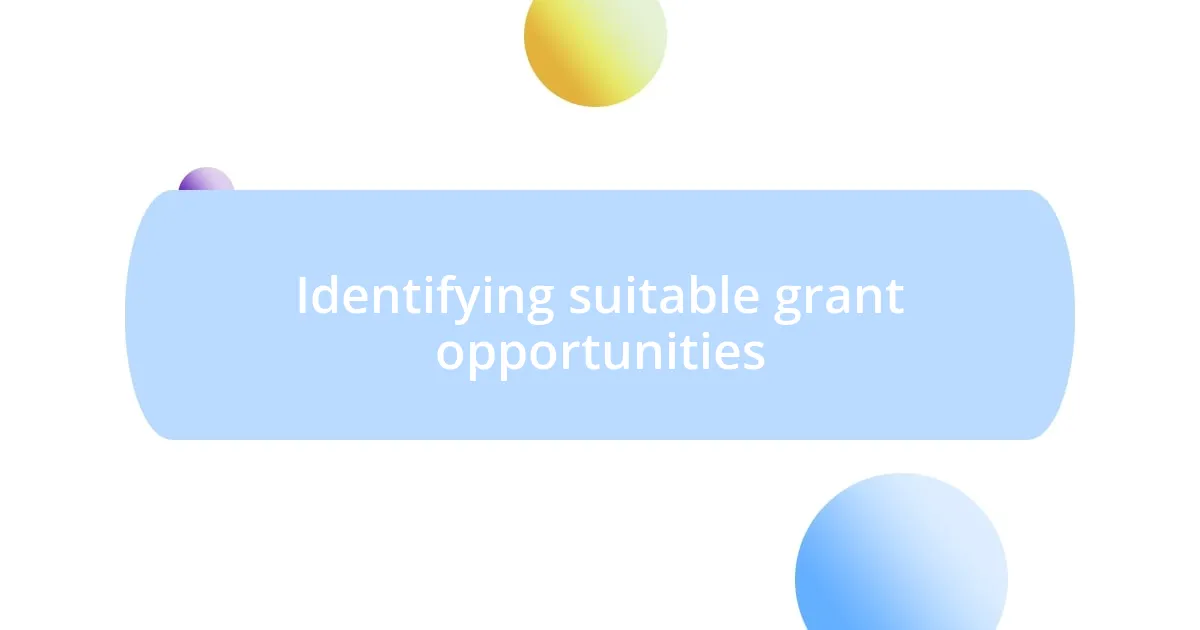
Identifying suitable grant opportunities
Identifying suitable grant opportunities can feel overwhelming, but it’s much more about strategic searching than you might think. In my experience, narrowing down options starts with a deep dive into your project’s specific needs and broadening your view on available funding sources. When I began this process, I felt a sense of excitement and determination—it was like piecing together a puzzle where each grant could potentially fit into my vision.
To streamline your search and ensure you’re focusing on the right opportunities, consider these steps:
- Research Targeted Grants: Look for grants that specifically support your area of interest, whether it’s education, arts, or community development.
- Utilize Online Databases: Websites like Grants.gov or Foundation Center can help you locate grants that suit your objectives.
- Engage with Local Organizations: Sometimes local foundations or nonprofits have grants tailored to community projects, which might not be widely advertised.
- Join Grant-Related Groups: Online forums and community groups often share leads on emerging funding opportunities that could align perfectly with your aspirations.
- Assess Eligibility Criteria: Before diving into applications, make sure you meet the requirements; this saves both time and energy for grants that suit you.
When I found my first grant opportunity, it clicked with my project vision in a way that felt almost serendipitous. The moment I realized I met all the eligibility criteria, I could hardly contain my excitement. I knew this was my chance, and that initial spark set the foundation for all my subsequent efforts.
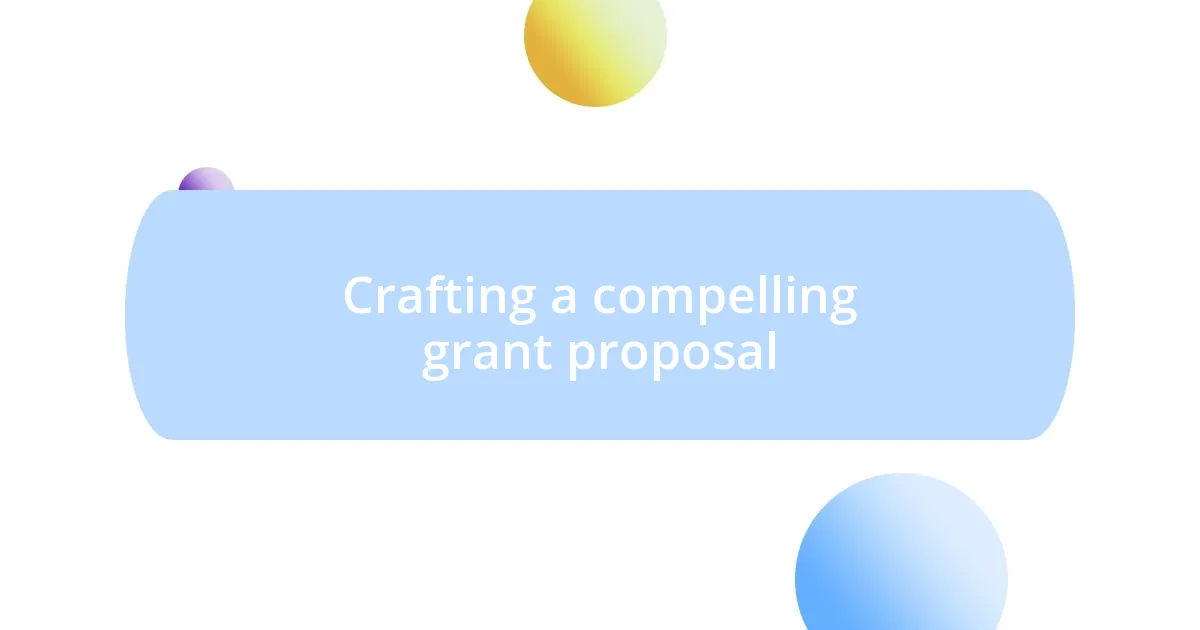
Crafting a compelling grant proposal
Crafting a compelling grant proposal is an art that goes beyond just filling out forms. I remember sitting at my kitchen table, armed with my laptop and a stack of notes, trying to weave together my vision and the requirements outlined in the grant guidelines. It was crucial to articulate not just what my project was about, but why it mattered. I found that telling my story with clarity and passion made a significant difference. Don’t you think that when we involve our authentic voice, it resonates more deeply?
Once I had my narrative figured out, I dived into the details, ensuring my proposal was data-driven yet accessible. Metrics, projections, and expected outcomes needed to shine through, but in a way that didn’t come off as jargon-laden. I remember being cautioned about using overly technical language—what’s the point if your reviewers miss the essence due to buzzwords? Simplicity and relevance became my north stars. How can you make sure your proposal is not just sound but also emotionally engaging?
The final touch involved meticulous editing and peer review. Having trusted colleagues read through my draft was invaluable. They offered fresh perspectives and caught blind spots I hadn’t even considered. I still recall the sense of relief and clarity I felt after making those adjustments. The takeaway? Collaboration enriches your proposal, making it more robust. You wouldn’t want to miss out on insights that could elevate your application to the next level.
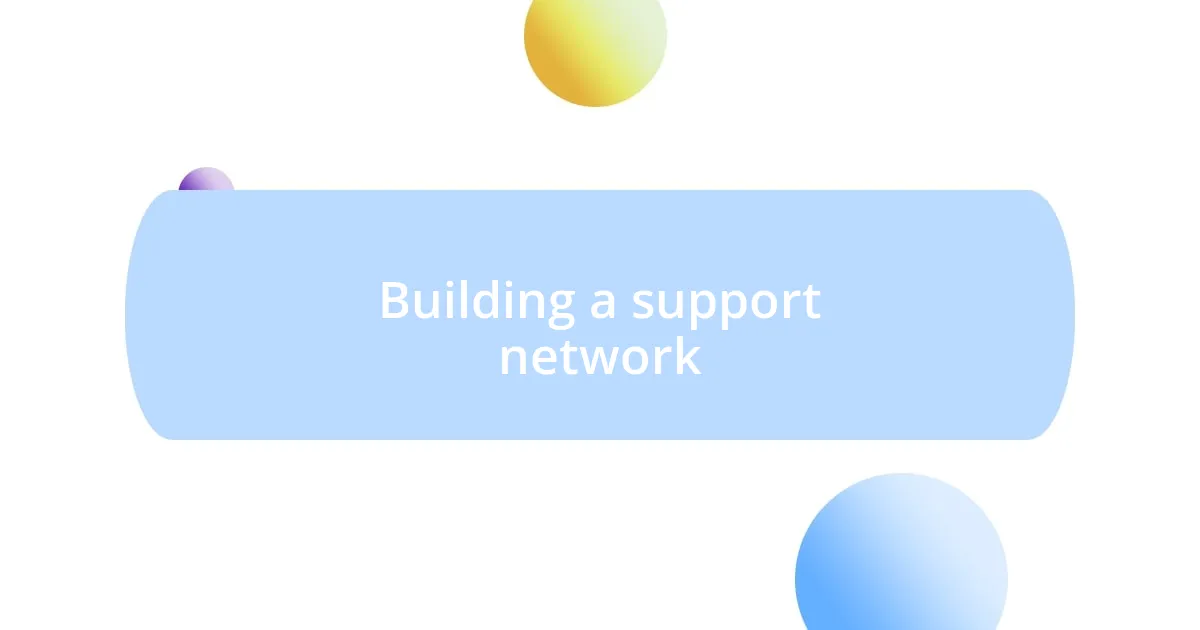
Building a support network
Building a support network can feel like an uphill battle, but it’s where the real magic happens. When I first dove into the grant-seeking process, I reached out to mentors and peers who had successfully navigated similar waters. I remember one conversation vividly, where a former grant recipient shared her tips over coffee. Her willingness to lend her knowledge made me feel less alone and truly inspired me.
Connecting with others in your field can open doors you didn’t even know existed. I joined a local grant-writing group, and the camaraderie was palpable; it felt like we were all in this together, sharing leads, drafts, and encouragement. I genuinely believe that having this circle not only helped improve my proposal but also boosted my confidence. Have you ever found support in unexpected places? I certainly did, and those connections became vital lifelines during my journey.
It’s essential to cultivate relationships beyond just seeking immediate assistance. I still check in with the friends I made during that time, sharing not just successes, but challenges too. Creating a network is as much about giving back as it is about receiving support. When you invest in your connections, they grow stronger, just like your chance of success in securing grants.
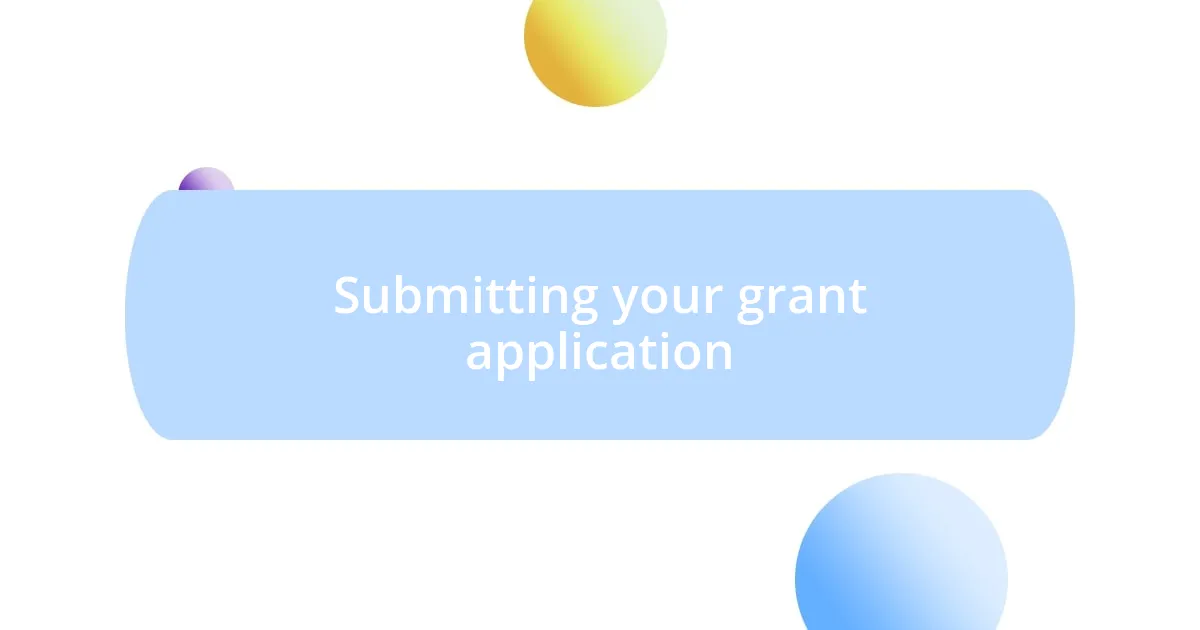
Submitting your grant application
Submitting your grant application can feel like standing on the edge of a diving board, heart racing and palms sweating. Once I printed out my final drafts, I took a moment to admire the fruits of my labor. It felt exhilarating and a bit terrifying to finally hit that “submit” button. What if it wasn’t good enough? But then I remembered all the hours spent refining my narrative. I had to trust the process and believe in the value of my proposal.
Before sending it off, I conducted one last review. I distinctly remember reading it aloud in my living room, pacing back and forth, ensuring everything flowed well. That simple act helped me catch awkward phrasing and inconsistencies I hadn’t spotted before. Have you ever found yourself saying a sentence out loud and suddenly realizing it doesn’t make sense? I definitely did, and it brought such clarity to my application.
Once the application was submitted, I couldn’t help but feel a mix of relief and anxiety. The waiting game was daunting, filled with thoughts of self-doubt. Yet, it was also a time for growth; I channeled that nervous energy into seeking more opportunities. This experience taught me that submitting an application is just one part of the journey. How do you keep your momentum going after you hit “send”? For me, it was about staying focused on the next steps, which kept the excitement alive.
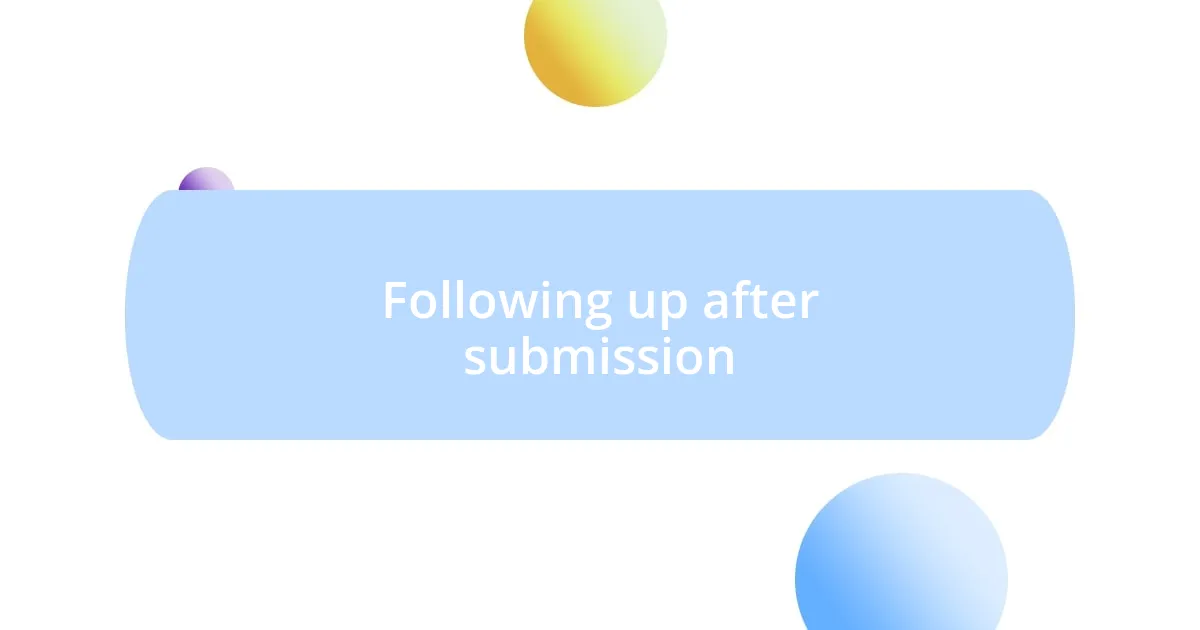
Following up after submission
After submitting my grant application, I knew the next step was to follow up. I remember feeling antsy as the days passed, so I decided to reach out to the grant office after a couple of weeks. A quick email asking for confirmation of receipt not only eased my nerves, but it also demonstrated my initiative. Have you ever felt that itch to check in? It’s completely normal, and it can set you apart as a proactive applicant.
Once I received a reassuring response, I felt a wave of relief. But more importantly, it opened a dialogue. I took the opportunity to ask about the review timeline, and to my surprise, they provided insights about their decision-making process. Knowing this not only helped manage my expectations but also deepened my understanding of what reviewers may prioritize. Isn’t it fascinating how a simple follow-up can lead to a treasure trove of information?
As the wait continued, I kept myself engaged by researching additional grants, exploring fresh ideas, and leaning on my support network for encouragement. While it was tempting to just fixate on that one application, I reminded myself that grant-seeking is a marathon, not a sprint. Have you faced similar challenges in staying motivated? I found that the process of seeking out new opportunities helped to soften the anxiety of waiting for results.




